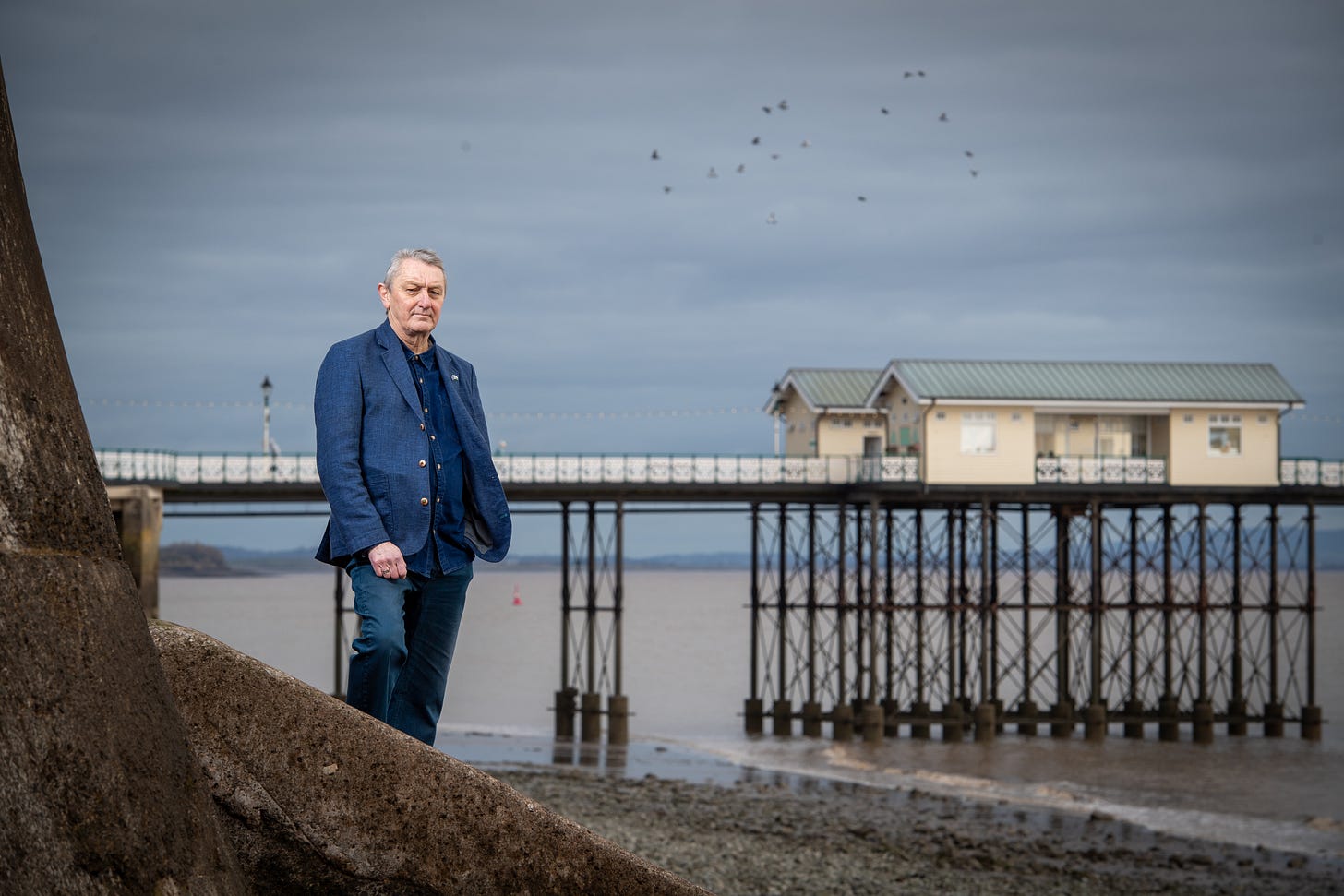How green is Wales?
We investigate the climate crisis in Cymru as well as interview the Wales Green Party leader
Happy new year!
I hope you all had the chance to have a break and recharge.
Thank you to everyone who sent me your predictions for Welsh politics in 2025. Some of them made me laugh out loud and others were so good they made me want to pass them off as my own.
If you still want to send your predictions you can do so in the comments or email me on will@willhayward.co.uk by January 8. The winner gets a six months complementary paid subscription.
Before we get into my predictions, here are a few words from our sponsor:
This newsletter is sponsored by Hello Starling. A proudly Welsh company, Hello Starling plan and buy media, backed by data, which is designed to get maximum attention and measurable results. They specialise in getting eyes on your organisation, product and website. If you are looking to get a return on investment, a change in perception, more visitors, more subscriptions, a bigger audience or a happier audience, I highly recommend you check them out here. In doing so you help support this newsletter.
This first letter of 2025 will be focussed on climate change in Wales culminating in my interview with Welsh Green Party leader Anthony Slaughter. I think the Greens are being underestimated ahead of the 2026 election and I am of the view that in the subsequent Senedd election in 2030 they could have double figure representation.

But first let’s take a whistle stop tour around how the climate and nature crisis is impacting Wales and the measures in place to tackle them.
A warming Wales
I don’t want this newsletter to be endlessly bleak and miserable so I will keep this section brief. These are just some of the specific ways that the shifting climate will impact Cymru:
Increase in the number and severity of wildfires due to droughts.
More widespread and severe river flooding from storms.
Some coastal areas (including Cardiff) underwater due to sea level rise.
More erratic weather conditions impacting production of agriculture.
These are to say nothing for the wider issues of increased immigration and global unrest. If you think the civil war in Syria caused mass population movements just wait till large parts of countries of the world are rendered uninhabitable.
I want to consider that flooding issue in more detail because it has been such a talking point over the last few years.
According to Natural Resources Wales, these are the number of properties at risk of river flooding:
90,500 residential (rounded to nearest 500)
12,500 non-residential
2,395 key public services
This is a total of 105,500
However in a century's time that total number will be 130,000.
The increases are even more stark when it comes to flooding from the ocean or surface water/small watercourses. These tables show the situation
On top of this we have the nature emergency which I will be detailing more in a future newsletter.
How is the Welsh Government doing in tackling the issue?
The first thing to say is that many of the policy areas that deal with climate change are not devolved. Industry, electricity and fuel supply as well as aviation are simply not within the gift of the WG.
However there are areas that it is their responsibility to tackle:
Agricultural/land use
Waste and recycling
Cars
Buildings
We looked at the issues around agricultural and land use last month in the newsletter on farming. You can read that here if you wish. But suffice to say the Welsh Government is miles behind where it needs to be on tree planting and on peatland restoration.
The value of tree planting is pretty well known but people are less aware of the vital importance of peatland. UK peatland stores more carbon than the combined forests of Britain, France and Germany. It is also a great ally in preventing flooding because it can clean and slow the flow of water as it can hold up to 20 times its weight in H2O.
On waste and recycling the Welsh Government is actually doing really well compared to other countries. The recent moves to improve commercial recycling to put it on par with domestic recycling are also to be applauded (though I wasn’t applauding as I chased my paper waste down the street after it blew out of its recycling bag this morning).
With regard to cars there is good and bad news. Let’s start with the bad…
In the following graphs there are three lines.
The black shows the current position, the yellow is where the Welsh Government wants us to be and the purple is where the independent Climate Change Committee says we need to be to hit net zero.
This graph shows the number of rapid electric car charging points in Wales (at the beginning of 2023). As you can see we are far away from what is required.
The same is true for electric van sales (you can barely see the black line):
However the good news is that Wales is on track for sales of electric vehicles.
When it comes to buildings the Welsh Government makes policy for social housing, public buildings and building regulations.
However it does not have control over energy efficiency standards for existing buildings (such as EPC requirements and regulation of private landlords), product policies, or regulating the financial sector. That said, they can influence it indirectly by providing loans and grants for improvements to buildings (such as investing in energy efficiency measures and low-carbon heating).
I have always felt that there has never been much of a joined up strategy from the Welsh Gov when it comes to making our buildings more energy efficient and green. I remember sitting down with Julie James when she was named climate change minister in 2021.
She made the bold target that gas boilers would be abandoned in Wales with no-one using one by 2030.
She told me:
“By 2026 I would really hope we will get to the point where everyone in Wales has access to fully green renewable electricity,” she said. “That is not to say that all of them will have taken it up but by 2030 we will have got the energy grid to be green with basically no fossil fuels at all - but that includes gas heating which is a big ask.”
By any measure that was an incredibly bold claim not least because thousands of new houses were being built in Wales at the time, many of which had gas boilers. So during the interview I asked her “will everyone with a boiler at present really no longer be using it to heat their homes by 2030?”
To this she said:
“Either the gas grid will have to be decarbonised so we will have to use hydrogen which means that the boilers will have to be retrofitted or we have to get people off gas on to clean electricity but that will involve bringing the cost down. It is very expensive to heat or cool houses with electricity so we need to bring the cost down so there is a big piece of work to do there with Ofgem and the grid.”
Given that we are now five years off 2030 I think we can all agree that the chances of there being no gas boilers except for retrofitted hydrogen ones in the next five years is pretty small.
This leads me on to the next point…
What score should the Welsh Government get for their green credentials?
I think there are real and genuine reasons to praise the Welsh Gov over the last few Senedd terms for their climate response.
They were ahead of many other governments in declaring a climate emergency and when Mark Drakeford won big in the 2021 election he created a specific and large climate change department within the Welsh Gov which included transport - thereby putting the climate crisis at the heart of decision making.
But like so many issues they have been very good at making public declarations but far less effective at actually delivering it. They made big commitments in the early drafts of the sustainable farming scheme regarding tree planting but appear to be pulling back (though we await the final draft). They spent years allowing green energy schemes just to remain in purgatory within the planning system. They set targets for peat restoration which were well below what the CCC said was needed to meet net zero.
Compared to the Conservative Government we had in the UK until last summer they have performed great but that is hardly a party you want to benchmark yourself against when it comes to the climate.
Overall they get a D-minus.
From an anarcho squatting punk to the Senedd? The Wales Green Party leader interview
Welsh Green Party leader Anthony Slaughter has taken an interesting route to running a political party in Wales.
Born in Hull, he spent most of childhood in South Africa. His politics was shaped by his engagement with the anti-apartheid movement. He tells me that it gave him insight into “the nature of power”.
He was also a member of the first South African punk band to release a single in Europe. I will be honest with my readers here and say, I didn’t entirely believe him when he told me this. But I looked him up, and it is true! It was named Riot Squad (not to be confused with a right wing UK band of the same name).
Mr Slaughter, which incidentally is an absolutely fantastic name for both a punk singer and Green Party leader, then moved to Hackney in London as a young man where he was part of the anarcho squatter scene.
“My younger self would have been horrified that I had joined a political party, let alone led one,” he said.
When you speak to Mr Slaughter, his manner is far more garden designer from Penarth (which he is) than East London anarchist squatter. A few minutes of conversation reveal a man and a party who clearly see that change is needed and have a quiet confidence that, perhaps, their time will soon come.
It is my view that the Welsh Greens are being overlooked when it comes to political analysis in Wales. Many people are looking for an alternative to Labour on the left of politics and more than a few of those don’t find Plaid palatable. This gives the Welsh Greens an opportunity. Add to this that two big stumbling blocks to them have been removed:
Keep reading with a 7-day free trial
Subscribe to The Will Hayward Newsletter to keep reading this post and get 7 days of free access to the full post archives.









